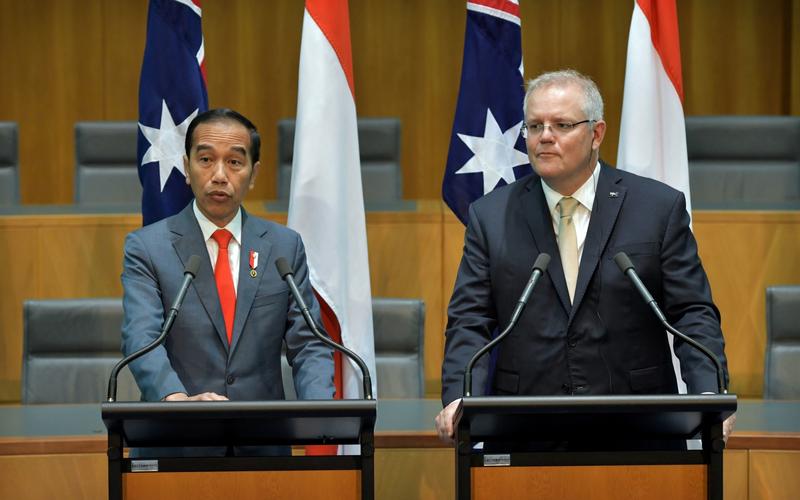 Indonesian President Joko Widodo, left, speaks during a press conference with Australian Prime Minister Scott Morrison at Parliament House in Canberra on Feb 10, 2020. (MARK GRAHAM / BLOOMBERG)
Indonesian President Joko Widodo, left, speaks during a press conference with Australian Prime Minister Scott Morrison at Parliament House in Canberra on Feb 10, 2020. (MARK GRAHAM / BLOOMBERG)
Indonesian President Joko Widodo said the long-delayed free-trade agreement with Australia will lead to improved relations with its neighbor, with education and services a key focus of the deal.
“This means in the next five years our bilateral relations will better directed,” Widodo told reporters in Canberra on Monday. “Going forward, economic relations between the two countries will grow and bring more tangible benefits for the people.”
Widodo and Morrison announced a 100-day action plan to implement the Indonesia-Australia Comprehensive Economic Partnership Agreement (IA-CEPA)
Indonesia’s often-strained relations with Australia are on the upswing, and on Monday Widodo became the first Indonesian leader to address Australia’s parliament since Susilo Bambang Yudhoyono in 2010.
Widodo and Australian Prime Minister Scott Morrison announced a 100-day action plan to implement the Indonesia-Australia Comprehensive Economic Partnership Agreement (IA-CEPA), which was finalized in March 2019 after eight years of negotiations.
ALSO READ: Australian opposition urged to support FTA with Indonesia
Widodo's visit has been heavily focused on the nations’ economic relationship, viewed as underdeveloped considering their geographical proximity. A series of diplomatic tensions and scandals have hindered ties between Australia and Southeast Asia’s biggest economy, which is also the world’s largest Muslim-majority country.
"This is a win-win agreement where stronger economic ties should also help to facilitate closer security, strategic and people-to-people ties between our two countries," Trade Minister Simon Birmingham said in a statement on Sunday night.
Widodo became the first Indonesian leader to address Australia’s parliament since Susilo Bambang Yudhoyono in 2010
Morrison hosted Widodo for an informal dinner on Sunday along with Marise Payne, Australia's foreign minister, and her Indonesian counterpart Retno Marsudi.
Education investment
Along with completing the free-trade agreement, which Birmingham expects will be implemented by May, Australia has also agreed to look at simplifying visa entry for Indonesians, while it was announced Melbourne’s Monash University will become the first Australian campus to open in the country.
The nations also agreed to establish an “energy dialogue,” Morrison told reporters, ensuring the “fuel sources for the future are very much part of Indonesia’s development and Australia’s.”
ALSO READ: Australia's leaders unmoved on climate action after bushfires
Two-way trade and investment between the nations is relatively small and significantly lags other nations in the region, including Singapore (US$30.4 billion) and Malaysia (US$16.7 billion). It was worth US$7.8 billion last year, down from the $10.5 billion recorded in 2014, according to Indonesian Trade Ministry data. Over that same period, Australia’s trade surplus with Indonesia has steadily grown from US$700 million to US$3.2 billion.
The deal will see more than 99 percent of Australian goods exports to Indonesia enter duty free or under preferential arrangements, while Australia will immediately eliminate all remaining tariffs on imports from Indonesia
The deal will see more than 99 percent of Australian goods exports to Indonesia enter duty free or under significantly improved and preferential arrangements, while Australia will immediately eliminate all remaining tariffs on imports from Indonesia.
Re-balancing ties
While Australia’s agriculture exports, including wheat, live animals and sugar, were valued at A$2.8 billion in 2018, services including education led the way, with two-way trade valued at A$5.8 billion that year. The deal will allow Australian-owned companies to invest in more Indonesian assets, supply mining and energy-related services, and operate railway in road transport infrastructure.
The deal paves the way for Indonesia to boost exports of petroleum, furniture, wood products and footwear. It opens the door for Australia’s education sector in Indonesia, something that pleases Jokowi as he looks to up-skill a labor force the size of the combined populations of Germany and South Korea. Of the 127 million Indonesians with jobs, less than 10 percent have a university degree.
Widodo also sees the deal as an opportunity to address the country’s overall trade shortfall and current account deficit. Indonesia posted a trade deficit of US$3.2 billion last year, after recording a record US$8.6 billion shortfall in 2018, while the central bank says the current account deficit narrowed to about 2.7 percent of gross domestic product last year.
ALSO READ: Indonesia and Australia sign new economic cooperation deal
The relationship has been tested many times, from revelations Australia attempted to tap the phone of Yudhoyono’s wife to issues over asylum-seeker boats, and the live cattle trade. More recently, Morrison caused a diplomatic row when he suggested Australia could formally recognize Jerusalem as the capital of Israel and move its embassy there.
Morrison said the two nations will seek to increase cooperation on maritime security.
Morrison and Widodo also discussed counterterrorism efforts and Widodo's proposal for visa requirements for Indonesians entering Australia to be relaxed, which, according to News Corp Australia, Morrison is "considering."
With Xinhua inputs


